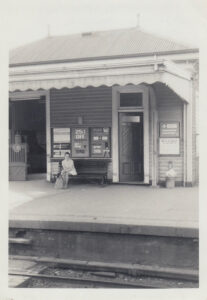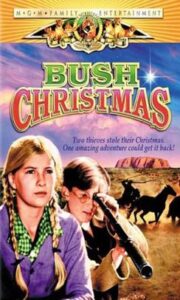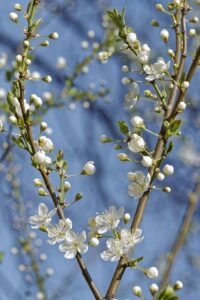
Eastsider News wants to share the beautifully written and evocative articles that Surrey Hills resident, Gill Bell has written about her experiences of living in this pleasant suburb with its tree lined streets and its strong community spirit.
Thank you Gill, for these lovely pieces. To read Gill’s account of the family’s day trip to Kallista, go here. To read her items on Chalk Graffiti in Surrey Hills, go here.
To find out more about Surrey Hills and its history, we suggest you go to the following websites:
Growing up in Surrey Hills: Holidays
Gill Bell
Holidays was the title in bold red of the second reader in our primary school classroom. The children on the cover were running joyfully into the ripples at the beach while white seagulls circled above them.
The picture reflected the joy of our simple childhood holidays. In the autumn or spring term breaks we would spend a week every year in Portarlington, a sleepy little fishing village on Corio Bay. This was a magical time, and I shall write more about these trips next time.
In summer we usually stayed in Surrey Hills, while our neighbours went to mysterious places called Rosebud and Lawn. It took me some years to realise that the latter name did not refer to grass.
On occasional hot days our father would drive us down Warrigal Rd to the beach. He would park among the tea-trees and we children would change in the hot car before racing over the burning sand into the shallows. The cold water of Port Phillip Bay made us gasp, but we waded on into the waist-deep water where we could try our swimming strokes. I bobbed in the water, feeling the sun warming my back and lulled by the sound of the lapping waves. The distant voices from shore seemed muted in the watery place. Eventually we waded back to shore. The shallows, which had seemed so cold, now felt warm to our feet. My younger siblings would be shuddering with cold by this stage despite the blazing sunshine, and would need to be towelled dry.
We climbed back into the stifling car and began the long trek back home where our mother was waiting for us. We were sandy and uncomfortable in our seats, and by the time we arrived home we were hotter than when we had left, but these excursions never lost their charm for us. Gus, our black and white cocker spaniel, would greet us, yawning after his nap on the cool concrete floor of the outdoor laundry.
Once a year our Great Aunt Marjorie would arrive by train at Spencer St station. We would pay at the machine for our platform tickets and wait expectantly as the train hissed its way into the station after its long journey from Brisbane.
Later in the Holidays book the children received letters from their aunt and uncle who were travelling to England to visit family. This was a familiar scenario for us in those days. Two sets of our aunts and uncles went on such voyages to England and Europe, and they also sent us long accounts of their adventures.
Every now and then relatives would leave for New Zealand on an ocean liner. We would arrive at bustling Station Pier, cross the gangplank to the ship and enter the wood-panelled passageways. I was delighted by the neat, cosy-looking cabins with their little round windows.
The moment of leave taking was poignant. There was one prolonged blast of the ship’s horn, and passengers and those bidding them farewell threw coloured streamers for one last moment of contact. As the ship drew slowly out, the paper streamers stretched, snapped and fell into the water. The last links to Australia were severed. At this distance I can still feel the emotion of the moment.
For me any future holidays can scarcely match the magic of these memories. There was the anticipation and then the intense impact of each moment. There was the nostalgia for places not yet visited, and the strange familiarity of greeting unknown relatives from afar.
The Holidays reader finishes with the children anticipating their summer break. Farewell, children, as you travel hopefully into the future.
21 July 2025
Growing up in Surrey Hills: Church on Sunday
Gill Bell
On a chilly winter morning in the late nineteen fifties our family arrived at the Surrey Hills Methodist Church for the usual eleven am Sunday service. Our breath puffed out in clouds as we followed our parents through the west door. Mr Rayment, as rigidly erect as if he were still a soldier in the Great War, greeted us.
Inside the church there was a hushed murmuring, and the organ played softly. Our family took its place in the second pew from the back. My father had sat here almost every Sunday of his married life, and only strangers attempted to sit here.
The air was still chilly inside, and I settled my feet gratefully on the heated bar suspended under the pew. Black hearing trumpets were provided at several locations for those with hearing loss. There was also a tinny broadcast of the service piped into the porch for mothers (never fathers) who may have to take a crying baby outside during the service.
I gazed around. The wooden floor was raked down towards the front of the church as in a theatre. The aisle was covered with a floral runner edged with red. There was the sweet fragrance of flowers and of face powder. Large bouquets of flowers stood at the front of the church. The stained-glass windows featured alternate bunches of purple and yellow grapes. Half-way down the church was the David window, framed in brilliant shades of blue. It showed the young shepherd boy gazing steadfastly into the distance. Our parents told us that he represented the bravery of our soldiers in the war. The Second World War was not yet fifteen years in the past, and it was still vivid for many in the congregation. The wooden pulpit was decorated with carved gum leaves which stood out from the surface in intricate detail. The centrepiece of the church was the magnificent organ. Its golden pipes were mounted in gleaming honey-coloured panelling.
The choir was already in place. The minister entered in his black robes and white reversed collar. The organ struck up in majestic chords and the music rose to the high wood-panelled ceiling. My father’s bass echoed the deep notes of the organ. I could read the words and sang along while my mother ran her gloved finger along under the music to show me how the notes went up and down.
As children we were not expected to sit through the sermon. There was a children’s address. ‘I’ll tell you a story’ the minister began, and we waited expectantly. After the children’s hymn, the large contingent of youngsters – were there fifty of us? –filed out to Sunday School. Here there were more stories and singing. After half an hour the organ music swelled for the final hymn and we made our way back to our families. Now it was time for chat and catching up with the week’s news.
On our arrival home we were greeted by the inviting sizzling sound and scent of roast dinner. Before we left for church, our mother had managed, by some magic, to prepare roast lamb and baked vegetables.
These were simpler times, and at the time it felt as if this routine would never change. Of course, much of this world is now lost. However, the memories remain: the beauty of the music; the ancient stories; the beautifully arranged flowers; the gracious surroundings and most of all the warmth of the community which wrapped its arms around us so that we felt its love.
Growing up in Surrey Hills: Autumn
Gill Bell
The days were drawing in. When we made our morning dash to the outdoor toilet, our breath puffed out in white clouds.
‘Fresh’ said our mother, relishing the break from summer heat. She put aside her summer recipes and began producing warming wintery dishes of osso bucco with its rich brown sauce. She made apple dumplings, peeling and coring Granny Smith apples and stuffing them with dates. Wrapped in pastry and baked in butter and sugar, they made a delicious autumn dessert.
The leaves on the old oak tree started to turn brown and drift to the ground. On Saturday afternoons a haze of fragrant smoke hung over the neighbourhood as families burned leaves in their backyard incinerators or even in small heaps in the gutters. The latter practice was banned by the local council, but backyard incinerators persisted until the 1980s.
Each autumn our father collected oak leaves to turn into rich compost. He created large wire cages from rounds of chicken wire, and filled them with oak leaves. In springtime he would mix the mulch with manure from the chook pens to nourish the soil.
The baby chicks in their pen had turned into awkward adolescent pullets. They were starting to sprout pin feathers and miniature red combs. Soon they would produce small test eggs. The chicks had lost their baby sweetness but were on their way to becoming dignified laying hens.
In the garden the soil was still warm from the summer heat. Dad busied himself planting more potatoes. The feathery tops of carrots appeared above the soil. Most of our vegetables were homegrown, including knobbly brown Jerusalem artichokes, which I enjoyed but have never encountered since. Other autumn crops such as capsicum, eggplant and zucchini were as yet unknown to us.
At the side of the chook pens grew an old fig tree which bore sweet purple fruit. The silver beet plants in front of the chook pens bore large glossy dark green leaves, but the pride of the garden was the row of sweet corn by the fence. These would grow into magnificent tall plants, with the golden heads of corn covered in a silvery-green papery wrapping. Each parcel was topped with a silken tassel.
The day of Harvest Festival at our local Methodist church arrived. At the front of the church stood long trestle tables laden with fruit and vegetables mainly produced by the congregation. Bales of straw and sheaves of wheat gave a country feel. Apples jostled for space with carrots and parsnips, and a large Queensland Blue pumpkin presided over the display. The air smelled deliciously of apples, pears and earthy vegetables. Our father proudly set out a long row of jars of golden honey from his bees.
The strong voices of the congregation rang through the church.
‘The ripe fruits in the garden
The pleasant summer sun’ we sang.
On this autumn Sunday afternoon, the sound of the Tramways brass band wafted across from Wattle Park. The distant notes of the brass came in gusts on the breeze, floating in the air with the drifting smoke. It was the very essence of autumn in the sixties.
Growing up in Surrey Hills: First day at school

Canterbury Primary School
Gill Bell
It was a sunny morning in early February 1957 when Mum parked the grey family Morris Minor under a shady oak tree outside the primary school gates.
It was my first day at school, and my big sister Mary-Ann was there to lead the way. With some apprehension I eyed the streams of children heading towards the school.
I clutched my mother’s hand as we entered the school grounds. I saw a tall white flagpole, some flowerbeds and a grand-looking red brick school building. It was all much more imposing than the little kindergarten I had attended the previous year, with its small tanbark playground…..
We are sure you will want to read the full description of Gill’s first day at school. Such a lovely, vivid piece full of tiny recognisable details. Please click here to read more.
Gill expresses her deep gratitude to Canterbury Primary School for a wonderful introduction to learning.
Elegy for an era

Gill and the old Surrey Hills station ca 1971
Gill Bell
The magpies are warbling their delicious song as I step out of the shade of the trees lining Windsor Crescent into the joyful brightness of a summer morning. It is my last year at school, and this place and I are on the cusp of change.
In the small park the oak leaves are still a soft green, and the tender grass has not yet been dried by summer heat. The air is fresh, but there is the heady hint of warmth to come.
I settle on to a seat and the morning wraps me round. I hear the distant breath of the city, which sounds like a giant mother hushing her baby to sleep.
‘Husssh,’ she says.
This park by the station is a magic place. This is the beating heart of Surrey Hills.
To read more of this piece, please click here.
Growing up in Surrey Hills: Summer

Craig children at Rye late 1950s with friend Glenys (left). Gill kneeling
Gill Bell
To be once more a little child
For one bright summer day. Lewis Carroll
The summer air was already warm when I tiptoed out of the bedroom I shared with my brother and sister and made my way outside. Bees were buzzing about the flowering bean plants and the white clover on the lawn. My bare feet tingled with the remembered pain of a recent sting.
The summer garden was heavy with fruit. The blood plums hung like Christmas baubles on the gnarled plum tree, and figs were slowly turning purple with the promise of sweetness. The hens crooned softly in their cages.
To read more of this article, please click here.

Craig family outside 13 Sherwood Rd Surrey Hills. Left to right: Harry, Cliff, Mary, Walter, Effie, Hector.
Hector’s first day at work
Gill Bell
It is a bright Monday morning on 3rd January 1938, and sixteen-year-old Hector Craig is preparing for his first day at work at Challingsworth steelworks in Richmond. He is a slender but muscular lad, good at sports, winning a silver cup for running at the school sports the previous year. He has wavy brown hair and a shy smile. Hec is nervous, but his father Walter who will accompany him this morning is calm. He is already a veteran of almost twenty-seven years at Challingsworth as boilermaker and foreman.
Mary, Hec’s mother, hands them their brown paper bags of sandwiches. Walter claps his grey felt hat on his head, and together they set off. The large oak tree in the front garden waves a wistful goodbye to Hec’s childhood.
Growing up in Surrey Hills: Christmas 1960 
Gill Bell
‘The north wind is tossing the leaves…’
The childish voices drift from the classroom opposite. This will be our grade next year. In our Grade four room we are busy making paper chains to decorate the room. We concentrate on cutting the pastel-coloured paper streamers to length and glueing the loops of chain together. Mr Sutherland pins the finished chains round the room and we admire our handiwork.
To read more, please click here.
Growing up in Surrey Hills – A Winter’s Day
Gill Bell
I floated up from a dream to the sound of the milkman’s horse clopping its way along the street. There was the familiar clink of our six daily pints of milk. I drifted back to sleep and woke again to the sound of my older sister practising scales on the piano. It was 7 am on a freezing July morning in the nineteen fifties.
I made a shivering dash to the outdoors toilet. The backyard was carpeted in white frost and the chooks crooned softly in their cages as they scratched in the dirt. The water bowl of Gus, our black and white cocker spaniel, was covered with a thick sheet of ice.
To read more, please click here.

Canterbury Sports Ground in winter fog
Growing up in Surrey Hills – Spring
Gill Bell
In the magical sphere of my memory, I step into the spring garden of my childhood. The pittosporum hedge at the front puts out clusters of creamy yellow blossoms which give off an intoxicating scent as I brush past them. The quince tree by the gate reaches out branches decked with blossoms of palest pink. Beside the driveway the silver birch bears tender new shoots, while the majestic oak tree unfurls soft leaves of freshest green. The air is filled with the scent of spring and the promise of warmth to come.
In the back garden the fruit trees burst into flower. There are apricot, peach and apple trees, but the queen of them all is the gnarled old blood plum tree, which bears branches of sumptuous white blossoms
To read more, please click here.
